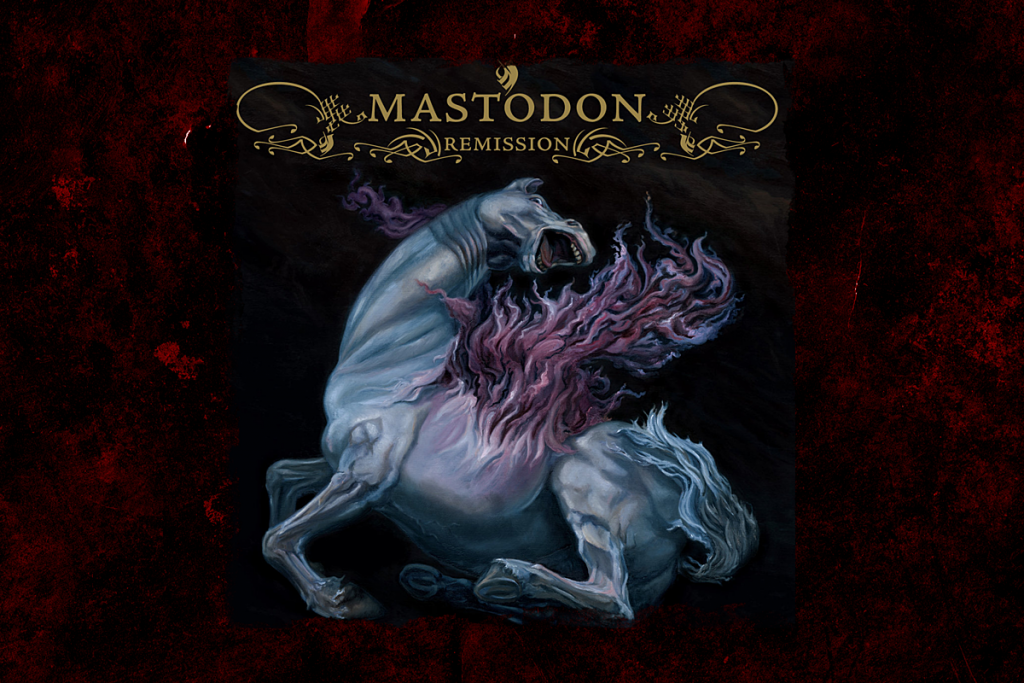
21 Years Ago: Mastodon Became a Contender with ‘Remission’
Long before Atlanta-based new American metal pioneers Mastodon started writing multifaceted songs intertwined with fetching harmonies and concept album narratives, they were a volcanic, scream-heavy band with one foot in thrash and the other in proggy sludge. The band’s first full-length, Remission, which came out May 28, 2002, offered hints of how Mastodon would develop over time. Guitarist Brent Hinds layered notey fills over dense, shifting rhythms that were somehow contained by the maniacal Neil Peart-inspired drumming of Brann Dailor.
Mastodon started working on songs for Remission after they formed in 2000, but none of the cuts appeared on their first two demos 2000’s 9 Song Demo, Demo 2001, or their 2001 EP’s Slick Leg and Lifesblood. But by the time they started working on their debut full-length they discovered that the 11 songs (including the eight-minute long instrumental bonus track “Elephant Man”) would work well together in an album loosely built around themes of fire, both natural and mythological.
That doesn’t mean Mastodon didn’t workshop the material. They premiered the galloping “Workhouse” in July 2001 at a show in Memphis, and played another five songs, “Trampled Under Hoof,” “Trilobite,” “Where Strides the Behemoth”, “Crusher Destroyer” and “Mother Puncher” at a WMFU radio show in August 2001. In addition, Eric Saner, who left the band by the end of 2000, was the original vocalist on “Trainwreck.”
Mastodon, “Crusher Destroyer” — Live (2002)
After working with producer Matt Washburn on Lifesblood, Mastodon connected with producer and fan Matt Bayles, who helped the band fine tune the songs at three studios — Zero Return, Red Lab and Exocet — in early 2002. The album was mastered at Sonorous Mastering Inc. in Tempe, Ariz.
Mastodon liked working with Bayles and were thrilled with the sound of Remission, so they hired him for their next two studio, full-lengths, 2004’s Leviathan and 2006’s Blood Mountain.
While Remission doesn’t have the polish or diversity of later Mastodon albums, it demonstrates an ambitious group going against the grain and tapping into a sound they would finesse considerably over time. And the chemistry exhibited by the band on the angular crunchy and triumphant “Crusher Destroyer,” the duality of tumbling chaos and subdued noodling in “Trilobite” and the delicate, atmospheric arpeggios and nimble solos on “Elephant Man” foreshadowed a group that would evolve into one of the most groundbreaking forces in modern metal.
Mastodon, “Trilobite”
Remission was re-released as a digipack on Oct. 21, 2003 around the same time as a video for “March of the Fire Ants” was getting strong airplay on MTV’s Headbangers Ball. The reissue came with a bonus cover of Thin Lizzy’s “Emerald” and a DVD containing nine songs recorded at the Masquerade in Atlanta on Dec. 1, 2002.
Loudwire contributor Jon Wiederhorn is the author of Raising Hell: Backstage Tales From the Lives of Metal Legends, co-author of Louder Than Hell: The Definitive Oral History of Metal, as well as the co-author of Scott Ian’s autobiography, I’m the Man: The Story of That Guy From Anthrax, and Al Jourgensen’s autobiography, Ministry: The Lost Gospels According to Al Jourgensen and the Agnostic Front book My Riot! Grit, Guts and Glory.
Mastodon Albums Ranked